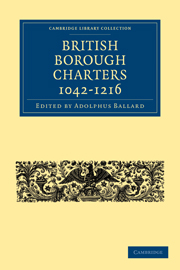INTRODUCTION
Published online by Cambridge University Press: 12 April 2011
Summary
Object of the Book
The time-honoured distinction that was drawn by our forefathers between a chartered borough and a market town shows the importance that they attached to the possession by a community of a document, granted by the King or the lord of the borough, guaranteeing the privileges by which it was distinguished from the villages in the neighbourhood. Its importance is not less today: for in this twentieth century, a Royal Charter is (or more strictly speaking, Royal Letters Patent are) requisite for the creation of a new borough, in order to bring a district and its inhabitants under the provisions of the Municipal Corporations Act. But while a charter is still necessary for the creation of a borough, yet today, when once it has been granted, little reference is thereafter made to it; all the rights and duties of the burgesses are derived from Acts of Parliament; during the eighteen years that I have been Town Clerk of the smallest borough in England, I have had occasion only once to consult the charter bringing the borough within the provisions of the Municipal Corporations Act, or to the scheme accompanying that charter, and that was to settle a point of disputed boundaries: but scarcely a day passes in which reference has not to be made to one or another of the Acts of Parliament defining the duties of the Town Council and of the burgesses.
- Type
- Chapter
- Information
- British Borough Charters 1042–1216 , pp. xiii - cxxxviPublisher: Cambridge University PressPrint publication year: 2010First published in: 1913



